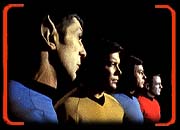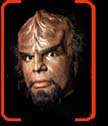 The original series was conceived at the height of the Cold War. One of the reasons that space travel had so captured the imagination of the US television audience was that America was engaged in a desperate Space Race with the Soviet Union. Space was not just a neutral territory for humans to explore and enjoy, but the latest arena for superpower competition... Star Trek showed the possibility of a different way. Gene Roddenberry himself believed that the series promoted international co-operation and harmony - a vision of a utopian future in which all (human) races and colours have united to explore new worlds. Yes, the crew of the Enterprise did sometimes fight with the aliens they meet, but they'd much rather get off with them. In Roddenberry's view, the series was explicitly anti-Cold War.
The original series was conceived at the height of the Cold War. One of the reasons that space travel had so captured the imagination of the US television audience was that America was engaged in a desperate Space Race with the Soviet Union. Space was not just a neutral territory for humans to explore and enjoy, but the latest arena for superpower competition... Star Trek showed the possibility of a different way. Gene Roddenberry himself believed that the series promoted international co-operation and harmony - a vision of a utopian future in which all (human) races and colours have united to explore new worlds. Yes, the crew of the Enterprise did sometimes fight with the aliens they meet, but they'd much rather get off with them. In Roddenberry's view, the series was explicitly anti-Cold War.
Gene Roddenberry, Creator of Star Trek
I have no belief that Star Trek depicts the actual future. It depicts us, now... I don't ask that every programme on the air be an exercise in reality, but I would like to see other shows do more, to talk about what we are, where we should be going, and what we lack. It troubles me that there are no programmes on television, at least none that I've seen, that point out that the world is operating in a very primitive way on the basis of hate. Our own president hates the Commies, and he and his henchmen believe that therefore everything they do to defeat the Commies, whether it's illegal or not, is justified because of their hate. If we are ever to turn the corner away from that, we need our artists and poets and entertainers pointing it out.
But some see the Federation as the United States of America writ large on the universe. Although there are people of different races on board the Enterprise, the American contingent is by far the largest, and only in the second series did a Russian join the crew (Walter Koenig as navigator Pavel Chekhov). Rumour has it that he only appeared as the result of a complaint in 'Pravda' pointing out that although the Russians were the first in space, there wasn't a Russian on the Enterprise... ( This story may well have been made up by the studio publicity department...)
What are we to make of the Enterprise's interactions with each new species it finds? Kirk always wants to sort out the uncivilised aliens and get them living by the Federation's values. He didn't stand for any of that love-and-peace nonsense on the hippy planet in 'This Side of Paradise'.
Peter David, Sci-Fi Writer and Star Trek Novelist
I have a theory that you can really get a glimpse of America's state of mind by looking at Star Trek. They were always right, they always knew exactly what to do, they would go in there with guns blazing; the Prime Directive - the non-interference directive - was the thing that Kirk quoted right before he always then ignored it.
Henry Jenkins, Co-Author of Science Fiction Audiences
Kirk continually intervenes. He continually disrupts and destabilises governments. He seems to embody the Vietnam-era idea of America as a policeman that interferes in other people's business.
And what about the aliens themselves? Is it just coincidence that the Federation has an ongoing conflict with the Klingon Empire, a ruthlessly expansionist state populated by men in beards?
Michael Dorn, Lt. Commander Worf in The Next Generation
We looked at the Russians as the Communists, as the enemy, and my take on it was Klingons are the Russians because they are looked on as a particular type of race. All through twenty years they were the mean guys, the enemy to kill on sight, and we have come to find out that they are not, they are people. That image we have of them is totally wrong... We look at Klingons as barbarians: how many times in the original series did Kirk say he's gonna level a planet if they don't give him back a couple of guys, destroy a whole race if they don't give him Scotty!
 There is one show in particular which directly refers to the superpower conflict and plays on Americans' fear of war. In 'The Omega Glory', Kirk and chums beam down to planet Omega IV, which centuries earlier had been ravaged by a terrible bacteriological war. It is now run by the authoritarian Kohms, while a terrorist group called the Yangs fight for freedom. The Yangs worship the American flag and recite a distorted version of the Preamble to the United States Constitution!
There is one show in particular which directly refers to the superpower conflict and plays on Americans' fear of war. In 'The Omega Glory', Kirk and chums beam down to planet Omega IV, which centuries earlier had been ravaged by a terrible bacteriological war. It is now run by the authoritarian Kohms, while a terrorist group called the Yangs fight for freedom. The Yangs worship the American flag and recite a distorted version of the Preamble to the United States Constitution!
A.A. Gill, TV Critic
The Kohms look like Oriental Russians; I mean they are the Mongol horde. The worst fear of mid-western America is that the men with snow on their boots are going to beam down into Osh Kosh and make them all sing the International. This is really where Star Trek comes clean about what it actually was all about - a good America fighting a Cold War against the forces of Communism. And the baddies, the Klingons and the other extraterrestials they meet, always epitomise the sorts of cartoon characteristics that Americans imagined Russian Communists had. They're usually big, they're militaristic, they're regimented, they don't think elliptically or laterally. Whereas the Starship Enterprise crew are always the things that Americans like about themselves, which is that they're gullible, they're hospitable, they're easy-going, they're friendly, and when the chips are down, of course, they're just as ruthless as anyone else.
This idea that the Cold War can be told in terms of the future in deep space makes it much easier for Americans to grasp, because you don't have to deal with a lot of complicated geography, and history, and current affairs.
I don't think that any of us believe anymore in the absolute good or evil of anything. The great thing about Star Trek was that nobody had any doubts.
